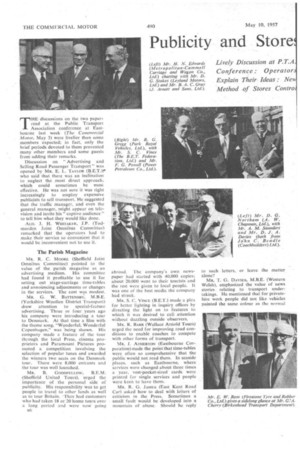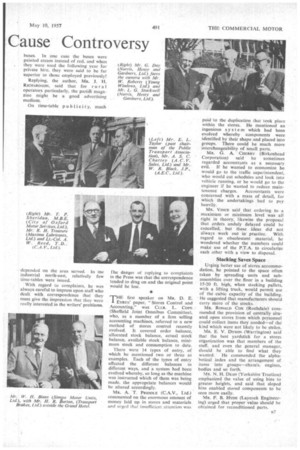Publicity and Store Cause Controversy
Page 40

Page 41

If you've noticed an error in this article please click here to report it so we can fix it.
THE discussions on the two papers read at the Public Transport Association conference at Eastbourne last week (The Commercial Motor, May 3) were livelier than some members expected; in fact, only the brief periods devoted to them prevented many other members and some guests from adding their remarks.
Discussion on Advertising and Selling Road Passenger Transport" was opened by MR. E. L. TAYLOR (B.E.T.).! who said that there was an inclination to neglect the most direct approach, which could sometimes be most effective. He was not sure it was right increasingly to employ expensive publicists to sell transport. He suggested that the traffic manager, and even the general manager, might appear on television and invite his " captive audience" to tell him what they would like done.
Ain. J. H. WHITAK ER, J.P. (Todrnorden Joint Omnibus Committee) remarked that the operators had to make their service so convenient that it would be inconvenient not to use it.
The Parish Magazine
MR. R. C. MOORE (Sheffield Joint Omnibus Committee) pointed to the value of the parish magazine as an advertising medium. His committee had found it profitable to use it for setting out stage-carriage time-tables and announcing adjustments or changes in the services. The cost was modest.
MR. G. W. BATTENSBY. M.B.E. (Yorkshire Woollen District Transport) drew attention to special-feature advertising. Three or four years ago his company were introducing a tour to Denmark. At that time a film with the theme song. "Wonderful, Wonderful Copenhagen," was being shown. His company made a feature of the tour through the local Press, cinema proprietors and Paramount Pictures promoted a competition involving the selection of popular tunes and awarded the winners two seats on the Denmark tour. There were 8,000 entrants and the tour was well launched.
MR. B. GOODFELLOW. B.E.M: (Sheffield United Tours), urged the importance of the personal side of publicity. His responsibility was to get people to travel to other lands as well as to tour Britain. 'They had customers who had taken 18 or 20 home tours over a long period and were no going B6 abroad. The company's own newspaper had started with 40,000 copies; about 20,000 went to their tourists and the rest were given to local people. It was one of the best media the company had struck.
MR. S. C. VINCE (B.E.T.) made a plea for better lighting in inquiry offices by directing the light on to features to which it was desired to call attention without dazzling outside observers.
MR. R. BARR (Wallace Arnold Tours) urged the need for improving road conditions to enable coaches to compete with other forms of transport.
MR. J. ATHERTON (Eastbourne Corporation) made the point that time-tables were often so comprehensive that the public would not read them. In seaside places, such as Eastbourne, where services were changed about three times a year, vest-pocket-sized cards were printed for single services and people were keen to have them.
MR. R. G. JAMES (East Kent Road Car) asked how to deal with letters of criticism in the Press. Sometimes a small fault would be developed into a mountain of abuse. Should he reply
to such letters, or leave the matter alone?
MR, T. G. DAVIES, M.B.E. (Western Welsh), emphasized the value of news stories relating to transport undertakings. He mentioned that for privatehire work people did not like vehicles painted the same colour as the normal buses. In one case the buses were painted cream instead of red, and when they were used the following year for private hire, they were said to be far superior to those employed previously!
Replying, the author, MR. J. H. RICHARDSON, said that for rural operators particularly, the parishmagazine might be a good advertising medium.
On time-table publicity, much depended on the area served. In tne industrial north-east, relatively few time-tables were issued.
With regard to complaints, he was always careful to impress upon staff who dealt with correspondence that they must give the impression that they were really interested in the writers' problems. fhe danger of replying to complaints in the Press was that the correspondence tended to drag on and the original point would be lost.
THE first speaker on MR. D. E. Evans' paper, "Stores Control and Accounting," was CLLR. L. Cops (Sheffield Joint Omnibus Committee), who, as a member of a firm selling accounting machines, referred to a new method of stores control recently evolved. It covered order balance, allocated stock balance, actual stock balance, available stock balance, minimum stock and consumption to date.
There were 14 types of entry, of which he mentioned two or three as examples. Each of the types of entry affected the different balances in different ways, and a system had been evolved whereby, so long as the machine was instructed which of them was being made, the appropriate balances would be altered accordingly.
MR. A. T. PRIDDLE (C.A.V., Ltd.) commented on the enormous amount of money laid up in stores and materials and urged that insufficient attention was
paid to the duplication that took place within the stores. He mentioned an ingenious system which had been evolved whereby components were identified by their shape and placed into groups. There could be much more interchangeability of small parts.
MR. C. A. CHERRY (Birkenhead Corporation) said he sometimes regarded accountants as a necessary evil. If he wanted to economize he would go to the traffic superintendent, who would cut schedules and look into vehicle running, or he would go to the engineer if he wanted to reduce maintenance charges. Accountants were concerned with a mass of detail, for which the undertakings had to pay heavily.
MR. VINCE said that ordering to a maximum or minimum level was all right in theory, likewise the proposal that orders unduly delayed could be cancelled, but these ideas did not always work out in practice. With regard to obsolescent material, he wondered whether the members could make use of the P.T.A. to circularize each other with a view to disposal.
Stacking Saves Space
Urging better use of stores accommodation, he pointed to the space often taken by spreading units and subassemblies over the floor in a building 15-20 ft. high, when stacking pallets, with a lifting truck, would permit use of the cubic capacity of the building. He suggested that manufacturers should carry more of the stocks.
MR. RONALD COX (Rochdale) commended the provision of centrally situated open stores from which personnel could collect items they needed—of the kind which were not likely to be stolen.
MR. E. V. DYSON (Warrington) said that the best yardstick for a stores organization was that members of the staff, and even the general manager, should be able to find what they wanted. He commended the alphabetical index and the arrangement of items into groups—chassis, engines, bodies and so forth.
MR. N. H. DEAN (Yorkshire Traction) emphasized the value of using bins to greater heights, and said that sloped bins enabled stored components to be seen more easily.
MR. F. B. HYDE (Laycock Engineering) urged that proper value should be obtained for reconditioned parts.




























































































